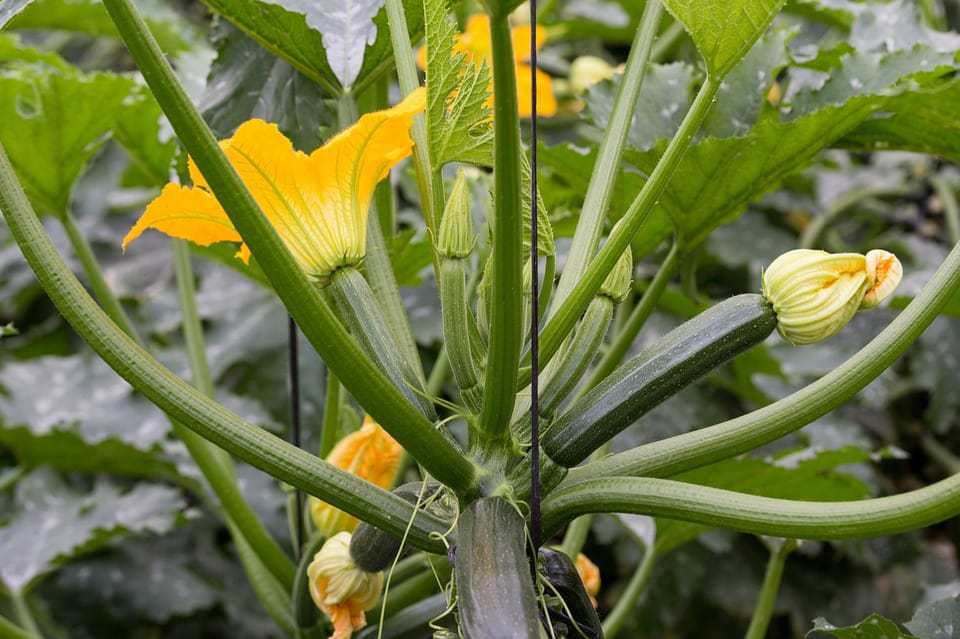Zucchinis, other types of squash, cucumbers, and watermelons all have female and male flowers on each plant. Male flowers are the source of pollen and female flowers are attached to a baby fruit which will start growing after being pollinated.
Any zucchini plant that is parthenocarpic produces zucchinis without pollination, and will be seedless unless it does get pollinated. The zucchinis themselves are otherwise identical to regular, non-parthenocarpic zucchinis. Parthenocarpic zucchinis will also produce mostly female flowers, increasing yield even more.
On this page:
Why You Should Grow Parthenocarpic Zucchini
The fact that parthenocarpic zucchini plants produce zucchinis without pollination means that you can grow them in greenhouses or even indoors without having to manually pollinate them.
Not only that, they also produce mostly female flowers, which means they can produce a lot more zucchinis than regular zucchini varieties. Most other zucchini varieties will produce more male flowers than female flowers.
If you grow them outside, it’s okay if you don’t have a lot of pollinators in your garden because your zucchinis will set fruit regardless. Parthenocarpic zucchini also tends to set fruit under hotter and cooler conditions than regular zucchini varieties.
Parthenocarpic zucchini plants are perfect for both the new gardener and experienced grower since they produce zucchinis with less work.
“Not only do parthenocarpic zucchini plants grow zucchinis without requiring pollination, they also produce mostly female flowers, which means they can produce a lot more zucchinis…”
Even if you just want to try growing a zucchini plant for the first time, I recommend parthenocarpic zucchinis because even with one plant, you will get a harvest, while one regular zucchini plant might not have a chance to get a single fruit if male and female flowers aren’t open at the same time.

Why You Might Not Want to Grow Parthenocarpic Zucchini
If you are a gardener who loves saving your seeds for next year, you might be disappointed in parthenocarpic varieties.
First, parthenocarpic fruit is seedless, unless it gets pollinated. Big, mature zucchinis will still have underdeveloped seeds inside. If you do decide to manually pollinate with the rare male flower, you will get seeds, but they might not be worth saving.
Zucchini varieties that are fully parthenocarpic are all hybrids (noted by the F1 designation). That means the breeder develops two lineages of zucchinis to cross-pollinate and produce hybrid seeds. These seeds combine the traits of two parents to produce a parthenocarpic variety.
If you plant those seeds and save and store the zucchini seeds from those zucchinis for next year, you will get inconsistent results. Half of your plants will be the same as the original parthenocarpic variety, but the other half will have different traits more similar to either parent.
Since you have to keep buying hybrid seeds to grow parthenocarpic zucchini, which are a little more expensive than regular open-pollinated or heirloom seeds, it can be a pain for some gardeners.
How to Grow Parthenocarpic Zucchini
Parthenocarpic zucchini is grown exactly like regular zucchini. Spacing, light, water, fertilizer, and care are all the same. The only difference is that if you’re growing indoors or in a greenhouse, you don’t need to manually pollinate parthenocarpic zucchini.
I’ve already written a guide on growing zucchini in containers, which goes into detail about growing and taking care of zucchinis, and also discusses parthenocarpic varieties as the preferred choice for container gardens.
Parthenocarpic Zucchini Varieties – Where to Buy
| Partenon F1 (sometimes spelled “Parthenon”) | Johnny’s Selected Seeds (US) |
| Cavili F1 | Gourmet Seed (US) |
| Venus F1 | Just Seed (UK) |
| Sure Thing F1 | Burpee (US) |
Note to international readers: Some of the US-based seed companies mentioned above also ship internationally.
This list isn’t exhaustive, but these are the common parthenocarpic varieties available. My personal favorites are Partenon (standard dark green zucchini) and Cavili (pale green zucchini). I’m not affiliated with any of these seed companies although I have purchased seeds from some of them before.
